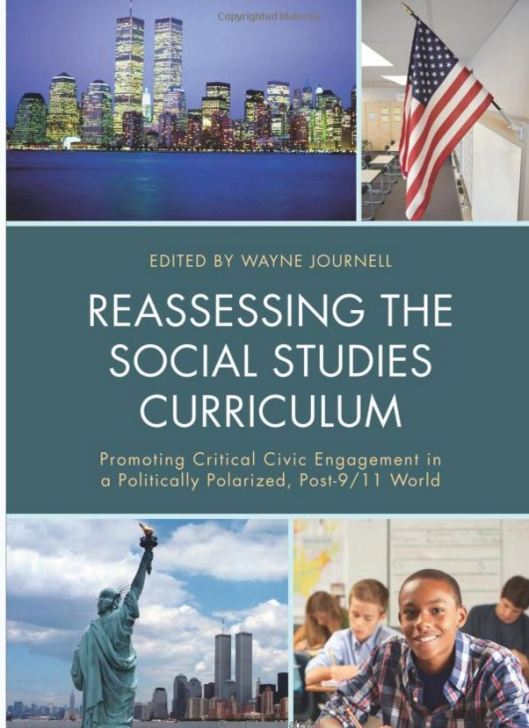
Well, if you will indulge me for a moment, I want to share with you a new book that you might find useful in thinking about the direction of social studies education today. It is titled Reassessing the Social Studies Curriculum: Promoting Critical Civic Engagement in a Politically Polarized, Post-9/11 World. Edited by Dr. Wayne Journell, who I had the pleasure of talking with when I was in North Carolina, it features chapters from excellent researchers, thinkers, and practitioners in the social studies. Most excitingly, it includes work from folks associated with us here at the Florida Joint Center for Citizenship. Our senior fellow, Dr. Michael Berson, coauthored the preface with his wife Ilene. Dr. Jane Lo, who is working with our Partnership for Civic Learning in re-envisioning high school government courses, authored “Role-Playing and Role-Dropping: Political Simulations as Portals to Pluralism in a Contentious Era” with the excellent Dr. Walter Parker. And of course it includes a chapter on civic education and the C3 Framework by yours truly, “Civil Liberties, Media Literacy, and Civic Education in the Post-9/11 Era: Helping Students Think Conceptually in Order to Act Civically”, co-authored with FJCC senior fellow Dr. Elizabeth Yeager Washington. Other luminaries of social studies education have contributed as well, and an overview of the text and the table of contents is below.
“The terrorist attacks of September 11, 2001 dramatically changed many aspects of American society, and the ramifications of that horrific event are still impacting the domestic and foreign policies of the United States. Yet, fifteen years after 9/11—an event that was predicted to change the scope of public education in the United States—we find that the social studies curriculum remains virtually the same as before the attacks. For a discipline charged with developing informed citizens prepared to enter a global economy, such curricular stagnation makes little sense. This book, which contains chapters from many leading scholars within the field of social studies education, both assesses the ways in which the social studies curriculum has failed to live up to the promises of progressive citizenship education made in the wake of the attacks and offers practical advice for teachers who wish to encourage a critical understanding of the post-9/11 global society in which their students live.”
Table of Contents
Foreword—Margaret Smith Crocco
Preface—Michael J. Berson & Ilene R. Berson
Introduction: September 11, 2001: The Day that Changed the World . . . But Not the Curriculum—Wayne Journell
Chapter One: International Conflict and National Destiny: World War I and History Teaching—Keith C. Barton
Chapter Two: 9/11 and the War on Terror in American Secondary Curriculum Fifteen Years Later—Jeremy Stoddard & Diana Hess
Chapter Three: Including 9/11 in the Elementary Grades: State Standards, Digital Resources, and Children’s Books—Elizabeth Bellows
Chapter Four: How Patriotism Matters in U.S. Social Studies Classrooms Fifteen Years After 9/11—Mark T. Kissling
Chapter Five: National Identity and Citizenship in a Pluralistic Society: Educators’ Messages Following 9/11 and Charlie Hebdo—Lisa Gilbert
Chapter Six: The Courage of Hopelessness: Creative Disruption of Everyday Life in the Classroom—E. Wayne Ross
Chapter Seven: Civil Liberties, Media Literacy, and Civic Education in the Post-9/11 Era: Helping Students Think Conceptually in Order to Act Civically—Stephen S. Masyada & Elizabeth Yeager Washington
Chapter Eight: Role-Playing and Role-Dropping: Political Simulations as Portals to Pluralism in a Contentious Era—Jane C. Lo & Walter C. Parker
Chapter Nine: The Psychology of Controversial Issues Discussions: Challenges and Opportunities in a Polarized, Post-9/11 Society—Christopher H. Clark & Patricia G. Avery
Afterword—Ron Evans

